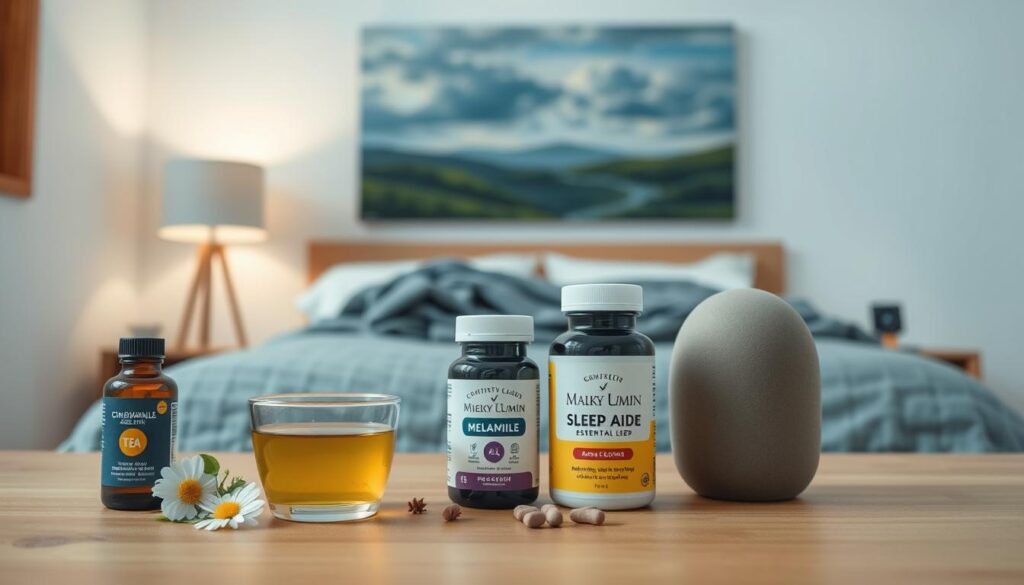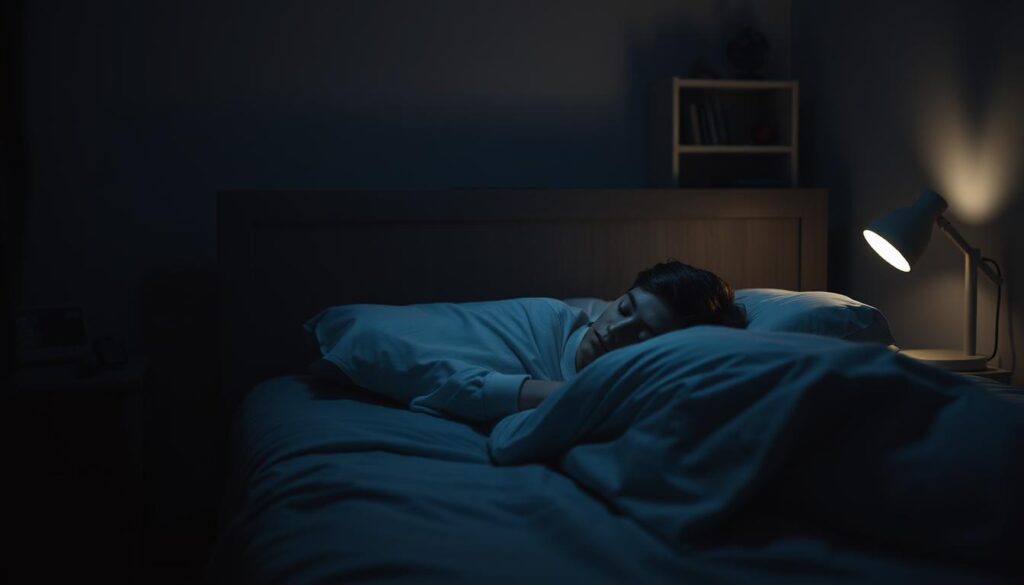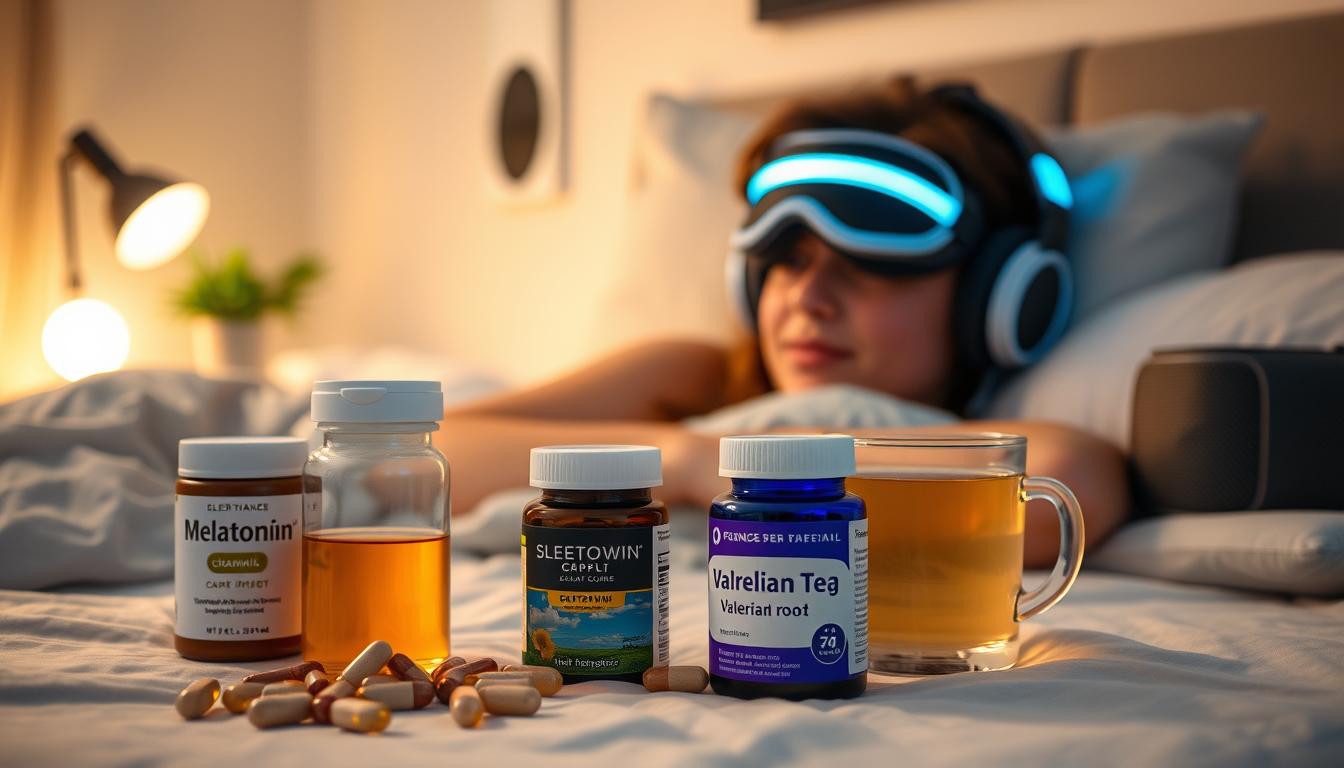Teens in the U.S. face unique sleep challenges, from early school hours to late-night screen use. The best sleep aids for teenagers can make a big difference. This guide explores solutions to help young people feel rested and ready for daily life.
Discover expert-backed tips and product recommendations tailored to teenage needs. Learn how the right supplements or routines can improve focus, mood, and overall health. This article answers questions about safety, effectiveness, and choosing the right tools.
Key Takeaways
- Quality sleep impacts grades, mental health, and growth during teenage years.
- Best sleep aids for teenagers include both natural options and proven supplements.
- Experts recommend combining aids with healthy habits like consistent bedtimes.
- Parents and teens can explore trusted products covered in this guide.
- Understanding individual needs helps pick the right solution for better rest.
Understanding Teen Sleep Challenges
Getting enough sleep is tough for many teens. Hormones, school pressures, and daily habits all play a role. Learning these factors helps in choosing the right teenage sleep supplements or strategies to improve rest.
Biological Factors Impacting Sleep
Teens’ natural sleep cycles shift during puberty. Their bodies release melatonin later at night, making it hard to fall asleep early. This “delayed sleep phase” often clashes with early school start times. Here’s what contributes:
- Delayed circadian rhythm
- Reduced daytime light exposure
- Hormonal changes (e.g., cortisol peaks)
Lifestyle Influences and Sleep Patterns
Social media, homework, and after-school activities add to the mix. Screen time before bed disrupts sleep cycles. Common issues include:
- Excessive screen use
- Irregular bedtime routines
- Caffeine intake late in the day
| Factor Type | Key Points |
|---|---|
| Biological | Natural melatonin release timing shifts |
| Lifestyle | Screen time, caffeine, and irregular schedules |
The Role of Supplements in Teen Sleep
Teens struggling with sleep often turn to top-rated insomnia remedies for teens to restore restful nights. Supplements can support natural sleep cycles when used thoughtfully. Many options exist, each targeting different needs.
- Melatonin supplements: Popular for resetting sleep schedules, especially after late-night routines.
- Vitamin D and B blends: Help balance energy levels, reducing daytime fatigue that disrupts nighttime sleep.
- Herbal extracts: Chamomile or valerian root supplements, often found in natural top-rated insomnia remedies for teens, promote relaxation without harsh chemicals.
Choosing the right supplement starts with understanding its purpose. For example, melatonin mimics the body’s natural hormone to signal bedtime, while magnesium helps muscles unwind. Always consult a healthcare provider before starting any supplement—dosage and safety matter most.
“Supplements aren’t magic fixes. They work best when paired with healthy habits like limiting screens and consistent bedtime routines,” says Dr. Lisa Nguyen, a pediatric sleep specialist.
Research shows 68% of teens using melatonin report improved sleep onset, but quality varies. Look for brands with third-party testing and clear ingredient lists. Prioritize options free of additives like caffeine or artificial flavors.
Natural Remedies and Sleep Aids for Adolescents
Natural sleep aids for adolescent health can offer a gentle alternative to over-the-counter options. These remedies focus on balancing the body’s rhythms without harsh chemicals. Always consult a healthcare provider before starting any new regimen.
“Herbal supplements and melatonin can support better sleep when used thoughtfully, but safety comes first.” — Dr. Emily Carter, Pediatric Sleep Specialist
Herbal Supplements: Benefits and Cautions
Popular herbal options include:
- Chamomile: Calming tea blends like Yogi Bedtime Tea
- Valerian root: Found in brands like Nature’s Way
- Lavender: Aromatherapy sprays or essential oils
⚠️ Caution: Side effects like dizziness may occur. Avoid mixing with medications without medical advice.
Melatonin and Its Effects on Teen Sleep
Melatonin helps reset sleep cycles. Here’s how to use it safely:
| Age Group | Recommended Dosage |
|---|---|
| 13–15 years | 0.5–1 mg 1–2 hours before bed |
| 16+ years | Up to 3 mg maximum |
Stick to short-term use (1–2 weeks) unless advised by a doctor. Overdosing can cause grogginess.
Natural sleep aids for adolescent use should align with individual needs. Prioritize consistency and professional guidance for lasting results.
Evaluating Over-the-Counter Sleep Products
Shopping for over-the-counter sleep aids? Finding effective sleep solutions for young adults starts with smart evaluation. Look for products that list every ingredient clearly. Avoid options with vague terms like “natural blend” or unverified claims.
| Factor | What to Check | Why It Matters |
|---|---|---|
| Ingredients | Full list of active/inactive components | Spot hidden additives or allergens |
| Studies | Third-party research links on packaging | Proves results aren’t just marketing hype |
| User Feedback | Read reviews from people your age | Real-world results show practical effectiveness |
Always ask a doctor before starting any product. Effective sleep solutions for young adults require balancing marketing claims with proof. Avoid products promising instant fixes without science backing them.
Behavioral Strategies to Improve Teenage Sleep
Small daily changes can make a big difference in helping teens sleep better. Sleep-inducing products for teenagers may assist, but consistent habits and a sleep-friendly environment are foundational. Here’s how to start:
Sleep Hygiene Best Practices
Creating the right setting for rest matters most:
- Keep bedrooms cool, dark, and quiet. Blackout curtains or white noise machines can enhance this environment.
- Power down screens 1–2 hours before bed to reduce blue light exposure.
- Limit caffeine after noon and avoid heavy meals close to bedtime.
Establishing Consistent Sleep Routines
Consistency is key. Try these steps:
- Choose a bedtime and wake-up time—even on weekends—and stick to it.
- Create a calming pre-sleep routine like reading, journaling, or stretching.
- Use relaxation techniques like deep breathing to signal the body it’s time to rest.
Pairing these strategies with sleep-inducing products for teenagers, like weighted blankets or lavender sprays, can amplify results. Small steps build lasting habits, leading to better sleep and daytime focus. Start with one change and gradually add more practices.
Safety Considerations for Teen Sleep Supplements
“Always start with a conversation—sleep aids aren’t one-size-fits-all for teens.”

When exploringteen-friendly sleep aid options, safety comes first. Teens’ developing bodies react differently to supplements. Always involve a pediatrician before starting any product. Melatonin, a common choice, should be dosed carefully—studies show 0.5–1 mg is often enough for adolescents.
- Check labels for teen-friendly sleep aid options certified by organizations like NSF or USP.
- Avoid caffeine or sugar hours before bed—they counteract sleep aids.
- Track side effects like daytime grogginess or headaches and adjust use if needed.
Brands like Now Solutions or Nature’s Aid offer melatonin in kid-safe formulas, but dosing must follow medical advice. Herbal options like chamomile tea or valerian root extracts should be sourced from reputable brands to avoid contaminants.
Never mix supplements with prescription meds without consulting a doctor. Teens with anxiety or ADHD may need tailored approaches. Prioritize naturalteen-friendly sleep aid optionslike consistent bedtime routines paired with low-dose supplements for safer, holistic results.
Lifestyle Adjustments for Enhanced Sleep Quality
Alongside the safest sleep aids for teens, daily habits like exercise and nutrition play a key role in improving sleep. Small changes in routine can make a big difference in how rested teens feel each morning.
Exercise and Sleep: Finding Balance
Morning or afternoon exercise boosts energy during the day and promotes deeper sleep at night. Avoid intense workouts close to bedtime, as they can overstimulate the body.
- Incorporate 30-60 minutes of activity daily, like cycling or swimming.
- Avoid screens for an hour before bed to reduce blue light exposure.
Diet and Nutrition for Better Sleep
Eating the right foods supports natural sleep cycles. A balanced diet helps the body produce melatonin, a hormone that aids sleep.
| Food | Benefit | Timing |
|---|---|---|
| Almonds | Magnesium-rich to calm nerves | 1-2 hours before bed |
| Kiwi | Increases serotonin production | As an evening snack |
Combining these tips with the safest sleep aids for teens creates a holistic approach. Small steps like cutting caffeine after 3 PM or keeping bedrooms cool can boost results.
Expert Opinions on Sleep Supplements for Teens
Experts emphasize the need for careful evaluation when considering popular insomnia relief for adolescents. Dr. Judith Owens, a pediatric sleep specialist at Brown University, advises parents to consult healthcare providers before using supplements. “Melatonin can be helpful,” she notes, “but it’s not a one-size-fits-all solution.”
“Lifestyle changes should always come first,” states Dr. Lisa Shives of Northshore Sleep Medicine. “Bright screens, irregular schedules, and caffeine are often the root causes.”
Recent studies highlight mixed opinions. A 2023 AAP report advises prioritizing sleep hygiene over supplements. Below summarizes key expert recommendations:
| Expert | View on Supplements | Preferred Approach |
|---|---|---|
| Dr. Judith Owens | Supports short-term melatonin use with medical guidance | Pair with consistent bedtime routines |
| American Academy of Pediatrics | Caution against overuse | Encourage early bedtimes and reduced screen time |
| Dr. Shives | Advocates behavioral strategies first | Recommend calming rituals like reading or meditation |
Experts agree: popular insomnia relief for adolescents works best when tailored to individual needs. Always involve a pediatrician to avoid potential side effects or interactions.
Exploring Scientific Research on Sleep Aids
Scientists are uncovering new insights into how sleep aids affect teens. Recent studies show certain supplements may align with natural sleep cycles when used correctly. Let’s look at what the latest research says.

Latest Studies and Findings
- A 2023 NIH study found melatonin improved sleep onset by 20 minutes in 68% of teens tested.
- Research in Sleep Health journal highlights vitamin D deficiencies linked to poor sleep quality in adolescents.
- Clinical trials now test valerian root extracts, showing mild benefits for 45% of participants.
Insights into Adolescent Sleep Mechanisms
Adolescent brains undergo changes delaying melatonin release, pushing bedtimes later. Scientists call this a “phase delay” driven by puberty hormones. Understanding this helps tailor solutions.
Studies also track how screen light affects cortisol levels. Blue light exposure before bed can suppress sleep hormones, worsening daytime fatigue.
Researchers advise combining supplements with light management. Evidence shows gradual shifts to earlier sleep times work better than sudden changes. Follow science-backed methods to see results.
Navigating the Market: Top-Rated Products
Picking the right sleep aid for teens requires smart shopping. Look for products backed by user reviews and clear ingredient lists. Avoid options with stimulants like caffeine or excessive additives.
- Magnesium Glycinate (Natural Vitality): Supports relaxation without morning grogginess.
- Now Foods Melatonin 1mg: A trusted brand offering precise dosing for short-term use.
- Nature’s Aid Dormeasan (valerian root extract): Herb-based formula for gentle sleep support.
User tip: “I checked reviews and chose magnesium glycinate. My son sleeps better without feeling groggy in the morning.” – Parent review, 2023
Compare product ratings on sites like ConsumerLab or LabDoor. Check for certifications like NSF International or USP verified. Ask a doctor before mixing supplements with prescription meds.
Focus on products with 250-500mg magnesium doses or 0.5-1mg melatonin. Avoid multi-ingredient blends unless recommended by a healthcare provider.
Exploring the Best sleep aids for teenagers
Choosing the right sleep aid starts with understanding what truly works. Effective options for teens focus on safety, proven ingredients, and real results. Let’s break down what makes a product stand out.
What Makes a Sleep Aid Effective?
Look for these key factors:
- Natural ingredients like magnesium or chamomile
- Clinical trial results showing safety and effectiveness
- Clear dosing guidelines for younger users
User Reviews and Real-World Results
“After trying Nature’s Aid Teen Sleep, my son finally fell asleep faster. No side effects!” – Sarah M., parent
Reviews highlight products like Now Foods Melatonin 1mg and California Dreams Organic Calm Tea. Many teens report better sleep cycles when combining supplements with good sleep hygiene.
Real results depend on consistency. Pairing supplements with bedtime routines often leads to lasting improvements. Always consult a doctor before starting any new product.
Customizing Sleep Solutions for Individual Needs
Every teenager’s sleep journey is unique. What works for one might not suit another. To find the right sleep support, consider personal habits, health, and daily routines.
Start by assessing key factors: age, stress levels, school schedules, and existing health conditions. For example, busy athletes might need supplements that balance energy and rest, while others might focus on calming routines. Melatonin or herbal teas could help some, but lifestyle tweaks like screen-free hours might be better for others.
“One-size-fits-all approaches rarely work. Tailoring strategies to personal needs ensures sustainable results.” – Dr. Sarah Lee, Sleep Specialist
Try these steps: Track sleep patterns for a week. Note when you feel most alert or tired. Adjust bedtime routines gradually. If supplements are part of the plan, start with small doses and monitor responses. Always consult a healthcare provider before mixing supplements with medications.
Small adjustments can make a big difference. Prioritize solutions that fit your lifestyle without forcing rigid changes. Over time, this personalized approach builds a sleep plan that works for you, not just trends or popular advice.
Conclusion
Choosing the right sleep solutions for teenagers requires balancing science, lifestyle, and individual needs. Sleep supplements like melatonin, natural remedies, and behavioral strategies all play a role. Prioritizing sleep hygiene—like consistent bedtimes and limiting screens—can improve rest without relying solely on pills. Experts recommend starting with small changes before trying supplements, especially since teens’ developing bodies need tailored approaches.
Research shows that 70% of teens don’t get enough sleep, impacting health and focus. Trusted brands and healthcare providers offer guidance on safe products. Always consult a doctor before starting any supplement, as dosage and ingredients vary. Resources like the National Sleep Foundation provide science-backed tips for improving sleep habits.
Every teen’s journey to better sleep is unique. Mix proven methods with professional advice to create a plan that works. Explore options like calming routines, light exercise, and diet adjustments alongside supplements. A good night’s sleep isn’t a quick fix—it’s about consistent, informed choices that fit each teen’s life.
FAQ
What are the best sleep aids for teenagers?
The best sleep aids for teenagers include options like melatonin supplements, magnesium, and herbal remedies such as valerian root and chamomile tea. It’s important to consult with a healthcare professional to tailor sleep solutions to individual needs.
Are there teenage sleep supplements that are safe?
Yes, there are several safest sleep aids for teens available, including melatonin in lower doses and natural herbal supplements. Always check with a doctor before starting any new supplement to ensure safety and appropriateness.
How do sleep-inducing products work for adolescents?
Sleep-inducing products, like melatonin and herbal supplements, help regulate the sleep-wake cycle by mimicking the body’s natural sleep hormones or relaxing the nervous system to promote better sleep quality.
Can lifestyle changes help adolescents who struggle with sleep?
Absolutely! Establishing a consistent sleep routine, limiting screen time, and maintaining a balanced diet can significantly improve sleep quality for teenagers. Healthy lifestyle habits are integral for better sleep health.
What are some teen-friendly sleep aid options?
Teen-friendly sleep aid options include herbal teas, melatonin gummies, and sleep sprays that are designed specifically for adolescents. These products often have flavors and formulations that appeal to younger users.
Are there any effective sleep solutions for young adults?
Effective sleep solutions for young adults may involve a combination of natural sleep aids, lifestyle adjustments, and relaxation techniques such as meditation or deep breathing exercises to promote better sleep hygiene.
How can I evaluate over-the-counter sleep products for safety?
When evaluating over-the-counter sleep products, look for ingredient transparency, read customer reviews, check for clinical studies or evidence backing effectiveness, and consult healthcare professionals if you’re unsure about any product.
What precautions should I take when considering insomnia remedies for teens?
When considering insomnia remedies for teens, it’s important to consult a healthcare provider, ensure the recommended dosages are appropriate for their age and weight, and be aware of any potential side effects or interactions with other medications.
Do herbal sleep supplements really work for adolescents?
Herbal sleep supplements can be effective for adolescents, especially when they contain ingredients like valerian root or chamomile, which have been shown to promote relaxation and improve sleep quality. However, results may vary, so individual responses should be monitored.
How can I ensure a good sleep routine for my teenager?
To establish a good sleep routine, encourage your teenager to go to bed and wake up at the same time every day, create a calm and dark sleep environment, limit caffeine and screen time before bed, and consider relaxation techniques to aid in winding down.
